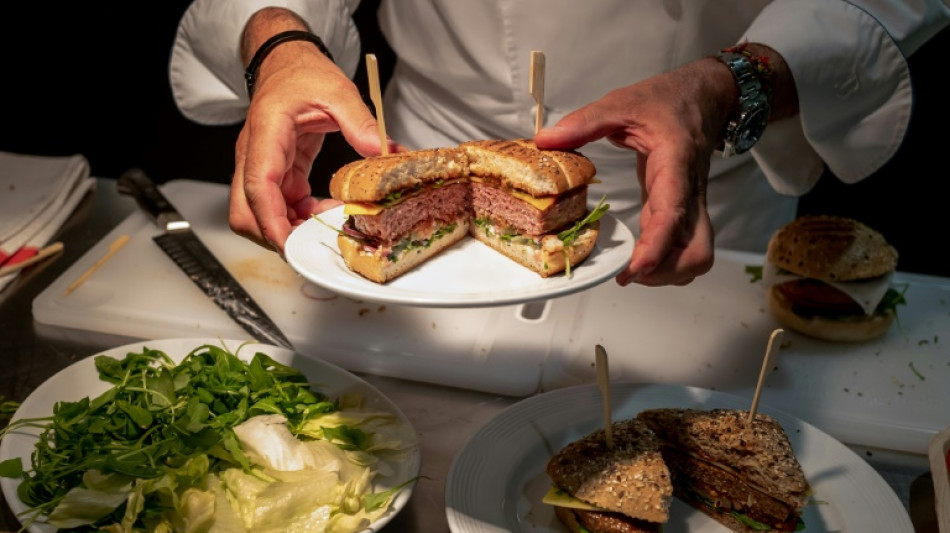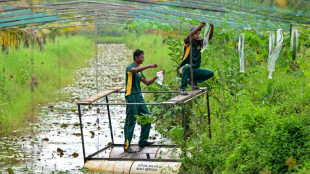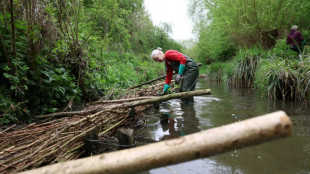
-
 Real Madrid duo Vinicius, Vazquez injured
Real Madrid duo Vinicius, Vazquez injured
-
Indian PM Modi vows strong response to any future 'terrorist attack'

-
 Opening statements start in Sean 'Diddy' Combs trial
Opening statements start in Sean 'Diddy' Combs trial
-
Snow cover of Swiss glaciers below average this year: study

-
 Jihadist attack kills 'several dozen' in Burkina Faso
Jihadist attack kills 'several dozen' in Burkina Faso
-
Ancelotti to leave Real Madrid for Brazil job

-
 Trump announces drug prices cut with swipe at Europe
Trump announces drug prices cut with swipe at Europe
-
Ancelotti exits Madrid, hoping to add World Cup with Brazil

-
 US, China agree to slash tariffs as Trump says to speak with Xi soon
US, China agree to slash tariffs as Trump says to speak with Xi soon
-
Ancelotti to take over as Brazil coach

-
 Israel urges ICC to drop arrest warrants against PM
Israel urges ICC to drop arrest warrants against PM
-
Poland to close Russian consulate in Krakow over 'sabotage'

-
 Kremlin rejects Europe's 'ultimatums' for truce with Ukraine
Kremlin rejects Europe's 'ultimatums' for truce with Ukraine
-
Ireland rugby captain Doris ruled out for up to six months

-
 Algerian attack survivor vows to be heard in court battle with award-winning author
Algerian attack survivor vows to be heard in court battle with award-winning author
-
Europa League glory could be 'turning point' for Spurs: Postecoglou

-
 White S.Africans resettled in US did not face 'persecution': govt
White S.Africans resettled in US did not face 'persecution': govt
-
Gaza faces 'critical risk of famine': UN report

-
 Indian teams defuse bombs in Kashmir border areas
Indian teams defuse bombs in Kashmir border areas
-
Kim Kardashian testifies in Paris multi-million-dollar robbery trial

-
 Alexander-Arnold exit will not overshadow Liverpool title party: Van Dijk
Alexander-Arnold exit will not overshadow Liverpool title party: Van Dijk
-
Osaka knocked out of Italian Open as fans await Sinner

-
 France condemns 'fake news' over Europe leaders' cocaine accusation
France condemns 'fake news' over Europe leaders' cocaine accusation
-
Indian PM Modi set to address nation after Pakistan truce

-
 With Israel ties on the table, UAE offers Saudis an example
With Israel ties on the table, UAE offers Saudis an example
-
UK urges Putin to 'get serious about peace'

-
 Leicester Tigers name Parling to replace Cheika as head coach
Leicester Tigers name Parling to replace Cheika as head coach
-
UK govt toughens immigration plans as hard-right gains

-
 Markets rally after China, US slash tariffs
Markets rally after China, US slash tariffs
-
Leo XIV urges release of jailed journalists as Zelensky invites to Ukraine

-
 Film legend Bardot backs Depardieu ahead of sexual assault verdict
Film legend Bardot backs Depardieu ahead of sexual assault verdict
-
Mbappe shows fallen Real Madrid new road to riches

-
 Drones hit Ukraine as Zelensky awaits Putin reply on talks
Drones hit Ukraine as Zelensky awaits Putin reply on talks
-
Indian great Kohli follows Rohit in retiring from Test cricket

-
 UK hosts European ministers for Ukraine talks amid ceasefire call
UK hosts European ministers for Ukraine talks amid ceasefire call
-
Copenhagen to offer giveaways to eco-friendly tourists

-
 Ocalan: founder of the Kurdish militant PKK who authored its end
Ocalan: founder of the Kurdish militant PKK who authored its end
-
Kurdish militant PKK says disbanding, ending armed struggle

-
 Under pressure, UK govt unveils flagship immigration plans
Under pressure, UK govt unveils flagship immigration plans
-
India great Virat Kohli retires from Test cricket

-
 US, China agree to slash tariffs in trade war de-escalation
US, China agree to slash tariffs in trade war de-escalation
-
Markets rally after China and US slash tariffs for 90 days

-
 India, Pakistan military to confer as ceasefire holds
India, Pakistan military to confer as ceasefire holds
-
Kurdish militant group PKK says disbanding, ending armed struggle

-
 Virat Kohli: Indian batting great and hero to hundreds of millions
Virat Kohli: Indian batting great and hero to hundreds of millions
-
India great Virat Kohli announces retirement from Test cricket

-
 Netanyahu vows further fighting despite planned US-Israeli hostage release
Netanyahu vows further fighting despite planned US-Israeli hostage release
-
Salt of the earth: Pilot project helping reclaim Sri Lankan farms

-
 UK towns harness nature to combat rising flood risk
UK towns harness nature to combat rising flood risk
-
Romania's far-right candidate clear favourite in presidential run-off


Microbe-based faux beef could save forests, slash CO2
Gradually replacing 20 percent of global beef and lamb consumption with meat-textured proteins grown in stainless steel vats could cut agriculture-related CO2 emissions and deforestation in half by 2050, researchers reported Wednesday.
Compared to a current-trends projection for population growth and food demand, swapping half of red meat consumption for so-called microbial proteins would see reductions in tree loss and CO2 pollution of more than 80 percent, they reported in the journal Nature.
"With a relatively small change in the consumption of ruminant meat, greenhouse gas emissions from tropical deforestation can be strongly reduced," lead author Florian Humpenoder, a scientist at the Potsdam Institute for Climate Impact Research (PIK), told AFP.
"This is an important contribution to reaching the Paris Agreement climate targets, with additional co-benefits for other sustainability goals."
A trio of landmark UN climate science reports since August have made it alarmingly clear that the Paris treaty's cornerstone target -- capping global warming "well below" two degrees -- is in serious jeopardy.
The global food system accounts for roughly a third of all carbon pollution, and beef production is the main culprit within the agricultural sector, according the UN's climate science advisory panel.
The cattle industry is a double threat.
It not only destroys CO2-absorbing tropical forests to make room for grazing pastures and cattle feed crops. In addition, belching livestock are a major source of methane, 30 times more potent as a greenhouse gas than CO2 on a 100-year timescale.
Microbe-based meat alternatives have been on supermarket shelves for decades.
But as the world scrambles for climate solutions, these and other "novel foods" are poised to grow into a major industry within decades, according market forecasts.
- Co-benefits -
Faux meat derived by culturing microbial or fungi-based cells undergoes a fermentation process, analogous to that for wine or beer.
The cells feed off of glucose -- from sugar cane or beets, for example -- to produce proteins, which means some cropland is needed for production.
But far less than for red meat, according to the study.
Assuming current agricultural methods and meat consumption patterns continue over the next 30 years, global pasture area is set to increase by nearly one million square kilometres (390,000 square miles).
If, however, 20 percent of that meat is replaced with microbe-based protein, pasture area is decreased even below current levels.
"About 1.2 million sq km less agricultural land is required for the same protein supply," said senior author Alexander Popp, also from PIK.
The benefits of protein made from microbes or fungi extend beyond climate and environmental impact, according to Hanna Tuomisto, a researcher at the University of Helsinki who did not take part in the study.
"Mycoprotein is an ideal substitute for meat because it is rich in protein and contains all the essential amino acids," she said in a comment, also in Nature.
Agricultural water use, along with the emissions of yet another greenhouse gas, nitrous oxide, would also be reduced.
"The efficiency of biotech-enabled alternatives offer huge future potential for more sustainable food provision," said Tilly Collins, deputy director of Imperial College London's Centre for Environmental Policy.
"Governments and the food production business need to coordinate to develop appropriate standards and thus future public confidence," she told the London-based Science Media Centre. "Our nuggets may never be the same again."
What remains uncertain, however, is whether enough meat lovers will give up their burgers and steaks for an alternative that shares the texture of meat more than the taste.
Only one of the six co-authors of the study had actually tasted the microbe-based meat substitute, according to Humpenoder.
"He likes it," he said.
L.Davis--AMWN